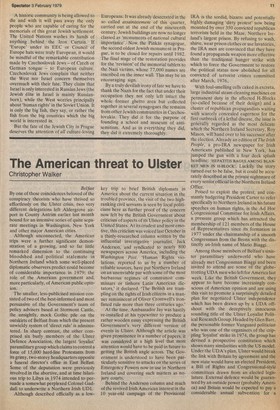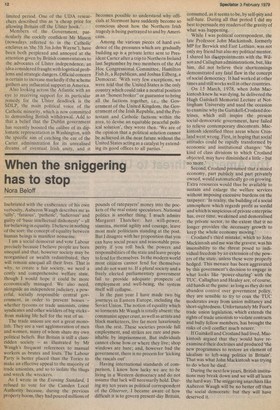The American threat to Ulster
Christopher Walker
Belfast By one of those coincidences beloved of the conspiracy theorists who have thrived so effortlessly on the Ulster crisis, two very different delegations left Aldergrove airport in County Antrim earlier last month bound for an intensive series of quite separate meetings in Washington, New York and other major American cities.
Although unconnected, the American trips were a further significant demonstration of a growing, and so far little remarked dimension to the continuing bloodshed and political stalemate in Northern Ireland which some well-placed diplomatic observers predict could become of considerable importance in 1979: the role of the American government and, more particularly, of American public opinion.
The smaller, less-publicised mission consisted of two of the best-informed and most persuasive of the Government's team of policy advisers based at Stormont Castle, the unsightly, mock Gothic pile on the outskirts of Belfast from which the present unwieldy system of 'direct rule' is administered. In sharp contrast, the other comprised six burly members of the Ulster Defence Association, the largest 'loyalist' paramilitary group which claims to control a force of 15,000 hard-line Protestants from its grimy, two-storey headquarters opposite a funeral director's office in East Belfast. Some of the deputation were previously involved in the abortive, and at time hilarious trip to Libya in 1974 intended to persuade a somewhat perplexed Colonel Gaddafi to underwrite a Northern Irish UDI.
Although described officially as a low key trip to brief British diplomats in America about the current situation in the troubled province, the visit of the two highranking civil servants is seen by local politicians here as further proof of the concern now felt by the British Government about criticism of aspects of its Ulster policy in the United States. At its crudest and most emotive, this criticism was voiced last October in a thinly-researched column written by the influential investigative journalist, Jack Anderson, and syndicated to nearly 800 newspapers across America, including the Washington Post. 'Human Rights violations, reported to us by a number of reliable sources, have put Northern Ireland on an unenviable par with some of the most barbarous regimes of communist commissars or tinhorn Latin American dictators,' it declared. 'The British are trampling on the rights of Irish citizens in a manner reminiscent of Oliver Cromwell's ironfisted rule more than three centuries ago.'
At the time, Ambassador Jay was hastily re-installed at his typewriter to produce a rather wooden essay expressing the British Government's very different version of events in Ulster. Although the article was given prominence in a number of papers, it was considered at a high level that more attention would have to be paid in future to getting the British angle across. The Government is understood to have been particularly sensitive to attacks on the series of Emergency Powers now in use in Northern Ireland and covering such matters as nojury courts.
Behind the Anderson column and much of the revived Irish American interest in the 10 year-old campaign of the Provisional IRA is the sordid, bizarre and potentially highly damaging 'dirty protest' now being mounted by over 350 convicted republican terrorists held in the Maze, Northern Ireland's largest prison. By refusing to wash, shave, wear prison clothes or use lavatories, the IRA men are convinced that they have found a propaganda weapon more effective than the traditional hunger strike with which to force the Government to restore the political status now abolished for all convicted of terrorist crimes committed after March, 1976_ With foul-smelling cells caked in excreta, large industrial steam cleaning machines on permanent duty in the affected H-Blocks (so-called because of their design) and a cluster of republican propagandists waiting with scarcely concealed eagerness for the first outbreak of a lethal disease, the issue is gefieral4/ regarded as the most delicate which the Northern Ireland Secretary, Roy Mason, will hand over to his successor after the election. Already an edition of The Irish People, a pro-IRA newspaper for Irish Americans published in New York, has jumped the gun with a four deck splash headline: 'HEPATITIS RAGES AMONG BLANKET MEN IN H-BLOCK'. Luckily the story turned out to be false, but it could be accurately described as the private nightmare of every senior official in the Northern Ireland office.
Poised to exploit the protest, and constantly badgering President Carter to refer specifically to Northern Ireland in his future speeches on human rights, is the Ad Hoc Congressional Committee for Irish Affairs, a pressure group which has attracted the membership of 121 members of the House of Representatives since its formation in 1977 under the chairmanship of a smooth Congressman from the Bronx with the distinctly un-Irish name of Mario Biaggi.
Among those members of Belfast's sinister paramilitary underworld who have already met Congressman Biaggi and been invited to attend are some of the globetrotting UDA men who left for America last week. Like the British Government, they appear to have become increasingly conscious of American opinion and are using this visit to promote a surprisingly detailed plan for negotiated Ulster independence which has been drawn up by a UDA offshoot with the deceptively innocuous sounding title of the Ulster Loyalist Political Research Group. Headed by Glen Barr, the personable former Vanguard politician who was one of the organisers of the crippling 'loyalist' strike in 1974, the group has devised a prospective constitution which shows many similarities with the US model. Under the UDA's plan, Ulster would break the link with Britain by agreement and the new state would have an elected President, a Bill of Rights and Congressional-style committees drawn from an elected legislature. External defence would be guaranteed by an outside power (probably America) and Britain would be expected to pay a considerable annual subvention for a limited period. One of the UDA researchers described this as 'a cheap price for allowing Britain off the Ulster hook.' Members of the Government, particularly the cockily confident Mr Mason (nowadays referred to in the Catholic enclaves as 'the 5ft 3in John Wayne'), have been both perplexed and annoyed at the attention given by British commentators to the advocates of Ulster independence, an idea considered fraught with logistical problems and strategic dangers. Official concern is certain to increase markedly if the scheme gathers any influential support in America.
Also looking across the Atlantic with an eye to receiving support for its particular remedy for the Ulster deadlock is the SDLP, the main political voice of the Catholic minority, which is now committed to demanding British withdrawal. Add to that a belief that the Dublin government has recently boosted the calibre of its diplomatic representation in Washington, with the specific aim of catching the ear of the Carter administration for its unrealised dreams of eventual Irish unity, and it becomes possible to understand why officials at Stormont have suddenly become so conscious about how the Northern Irish tragedy is being portrayed to and by Americans.
Among the various pieces of hard evidence of the pressures which are gradually building up is a private letter sent to President Carter after a trip to Northern Ireland last September by two members of the Ad Hoc Congressional Committee, Hamilton Fish Jr, a Republican, and Joshua Eilberg, a Democrat: 'With very few exceptions, we were told that the United States is the only country which could take a neutral position as an "honest broker" or guarantor to bring all the factions together, i.e., the Government of the United Kingdom, the Government of the Irish Republic, and the Protestant and Catholic factions within the area, to devise an equitable peaceful political solution', they wrote then. 'We are of the opinion that a political solution cannot be achieved in the near future without the United States acting as a catalyst by extending its good offices to all parties.'



































 Previous page
Previous page